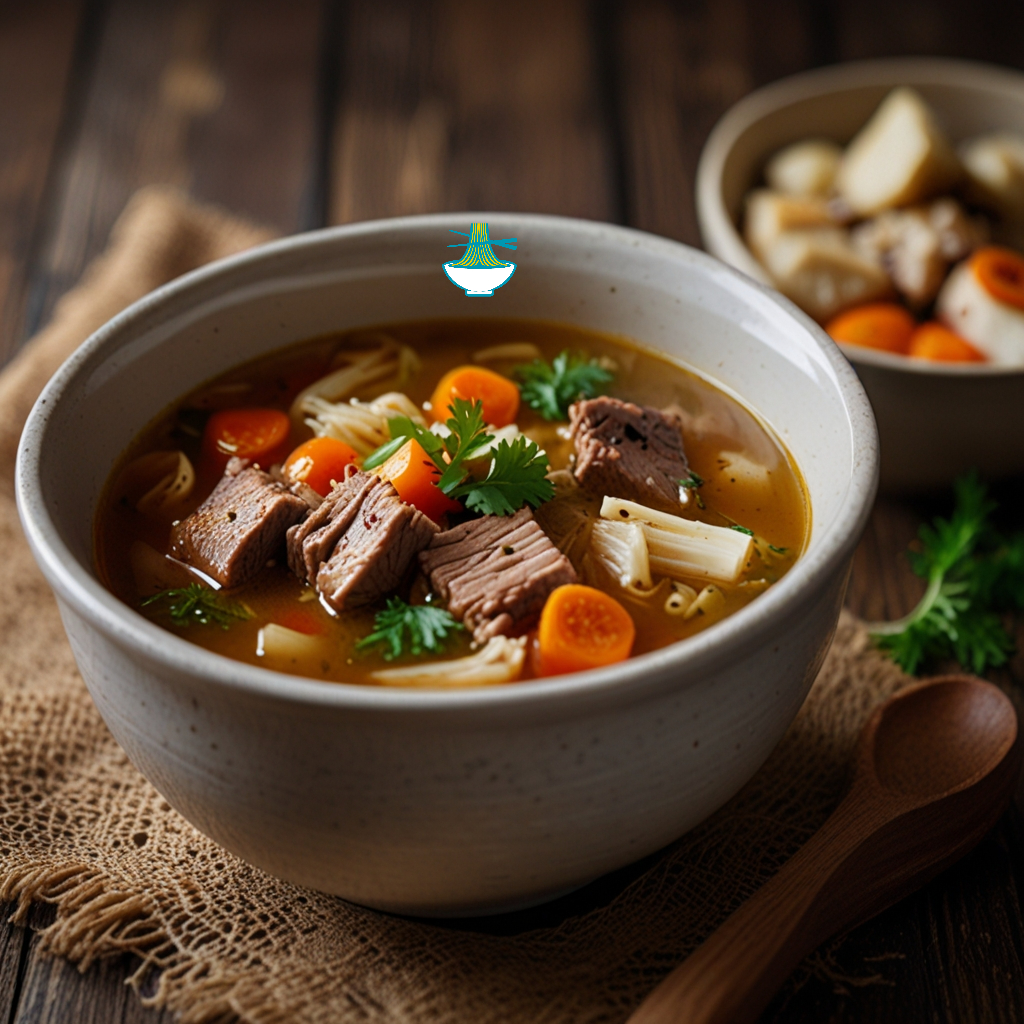Yakhni is a traditional clear soup originating from Kashmir, India. It's prepared with meat, rice, and vegetables, simmered in flavorful broth. The dish has roots in Persian cuisine, brought to Kashmir by the Mughals. Its fragrant spices and wholesome ingredients make it a beloved comfort food, enjoyed for centuries in the region and beyond.
Ingredients:
- 500g meat (chicken or lamb), cut into pieces
- 1 onion, finely chopped
- 1 cup rice, washed and drained
- 2 carrots, diced
- 2 potatoes, diced
- 4 cups water
- Salt to taste
- 1 teaspoon whole black peppercorns
- 1 teaspoon cumin seeds
- 2-3 cloves
- 2-3 green cardamom pods
- 1-inch cinnamon stick
- Fresh coriander leaves for garnish
Method of Preparation:
1. In a large pot, add the meat, onion, water, and all the whole spices.
2. Bring to a boil, then reduce heat and simmer for about 30 minutes until the meat is tender.
3. Skim off any foam that forms on the surface.
4. Add the rice, carrots, and potatoes to the pot. Cook for another 15-20 minutes until the vegetables are tender and the rice is cooked.
5. Season with salt to taste.
6. Serve hot, garnished with fresh coriander leaves.
This simple and flavorful recipe for Yakhni Soup is easy to follow and perfect for a comforting meal.
Nutrition Value:
1. 500g meat (chicken or lamb), cut into pieces:
- Calories: Approximately 1000-1200 kcal (depending on the type of meat and fat content)
- Carbohydrates: 0g
- Protein: Around 100-120g
- Fat: Around 60-80g
- Sodium: Varies based on preparation method, around 100-200mg
- Cholesterol: Varies based on the type of meat, around 300-400mg
- Nutritional benefits: High-quality protein, essential amino acids, iron, zinc, and vitamin B12.
2. 1 onion, finely chopped:
- Calories: Approximately 40-50 kcal
- Carbohydrates: Around 10-12g
- Protein: Around 1g
- Fat: Negligible
- Sodium: Very low, less than 5mg
- Cholesterol: None
- Nutritional benefits: Rich in antioxidants, vitamins C and B6, folate, and fiber.
3. 1 cup rice, washed and drained:
- Calories: Approximately 200-240 kcal
- Carbohydrates: Around 45-50g
- Protein: Around 4-5g
- Fat: Around 0-1g
- Sodium: Varies based on preparation method, around 0-5mg
- Cholesterol: None
- Nutritional benefits: Good source of carbohydrates, energy, and some essential vitamins and minerals, such as manganese and magnesium.
4. 2 carrots, diced:
- Calories: Approximately 50-60 kcal (per carrot)
- Carbohydrates: Around 12-15g (per carrot)
- Protein: Around 1-2g (per carrot)
- Fat: Around 0-1g (per carrot)
- Sodium: Very low, less than 50mg (per carrot)
- Cholesterol: None
- Nutritional benefits: High in beta-carotene (vitamin A), fiber, potassium, and antioxidants.
5. 2 potatoes, diced:
- Calories: Approximately 200-240 kcal (per medium-sized potato)
- Carbohydrates: Around 45-50g (per potato)
- Protein: Around 4-5g (per potato)
- Fat: Negligible
- Sodium: Very low, less than 20mg (per potato)
- Cholesterol: None
- Nutritional benefits: Good source of carbohydrates, potassium, vitamin C, and B vitamins.
6. 4 cups water:
- Calories: 0 kcal
- Carbohydrates: 0g
- Protein: 0g
- Fat: 0g
- Sodium: Varies depending on water source
- Cholesterol: None
- Nutritional benefits: Essential for hydration and maintaining bodily functions.
7. Salt to taste:
- Calories: 0 kcal
- Carbohydrates: 0g
- Protein: 0g
- Fat: 0g
- Sodium: Varies depending on amount used
- Cholesterol: None
- Nutritional benefits: Provides essential sodium for electrolyte balance, but excessive consumption may lead to health issues.
8. 1 teaspoon whole black peppercorns:
- Calories: Approximately 5 kcal
- Carbohydrates: Around 1g
- Protein: Around 0g
- Fat: Around 0g
- Sodium: Very low, less than 1mg
- Cholesterol: None
- Nutritional benefits: Contains antioxidants and may have anti-inflammatory properties.
9. 1 teaspoon cumin seeds:
- Calories: Approximately 8-10 kcal
- Carbohydrates: Around 1-2g
- Protein: Around 0-1g
- Fat: Around 0-1g
- Sodium: Very low, less than 1mg
- Cholesterol: None
- Nutritional benefits: Contains antioxidants, may aid digestion, and has potential anti-inflammatory properties.
10. 2-3 cloves:
- Calories: Approximately 5-10 kcal (for 2-3 cloves)
- Carbohydrates: Around 1-2g (for 2-3 cloves)
- Protein: Around 0g
- Fat: Around 0g
- Sodium: Very low, less than 1mg
- Cholesterol: None
- Nutritional benefits: Contains antioxidants and may have antimicrobial properties.
11. 2-3 green cardamom pods:
- Calories: Approximately 5-10 kcal (for 2-3 pods)
- Carbohydrates: Around 1-2g (for 2-3 pods)
- Protein: Around 0g
- Fat: Around 0g
- Sodium: Very low, less than 1mg
- Cholesterol: None
- Nutritional benefits: Contains antioxidants and may aid digestion.
12. 1-inch cinnamon stick:
- Calories: Approximately 5-10 kcal
- Carbohydrates: Around 1-2g
- Protein: Around 0g
- Fat: Around 0g
- Sodium: Very low, less than 1mg
- Cholesterol: None
- Nutritional benefits: Contains antioxidants and may have anti-inflammatory properties.
13. Fresh coriander leaves for garnish:
- Calories: Approximately 1-5 kcal (depending on amount used)
- Carbohydrates: Around 0-1g
- Protein: Around 0g
- Fat: Around 0g
- Sodium: Very low, less than 1mg
- Cholesterol: None
- Nutritional benefits: Contains antioxidants, vitamin K, and may aid digestion.
These nutritional values are approximate and can vary based on factors such as cooking methods and ingredient sizes.


Comments